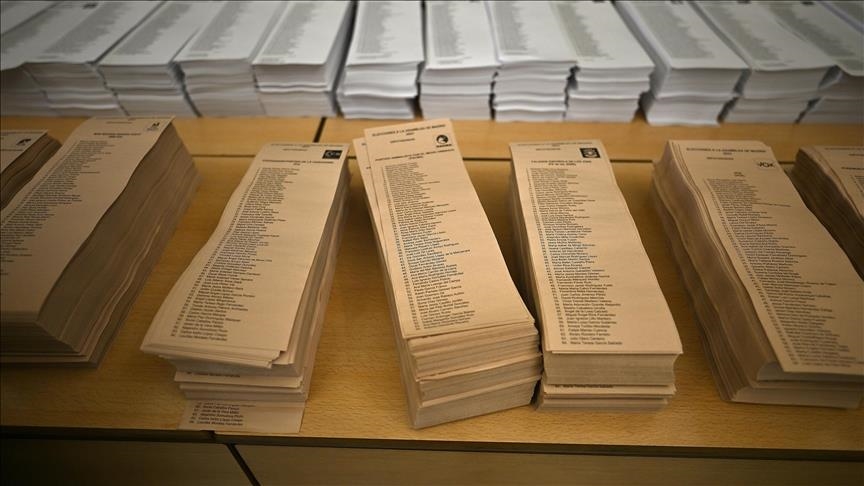Montenegrins to elect lawmakers Sunday
15 coalitions, parties to compete for 81 seats in parliament in hopes to end 3 years of crisis

BELGRADE, Serbia
Voters in the Western Balkan nation of Montenegro will go the polls Sunday to choose the members of their next legislative assembly in snap parliamentary elections.
Fifteen coalitions and parties are competing for seats in the 81-person parliament in the country's sixth general election since the country transitioned to a multi-party system in 1990.
According to data from the State Election Commission, more than 542,000 registered voters will be eligible to cast ballots at 1,038 polling stations across the nation on Sunday.
The early general election was called by former President Milo Djukanovic in the face of a no-confidence vote against the government, led by Prime Minister Dritan Abazovic.
It may finally bring a stable administration after almost three years of constant political turbulence, with two governments ousted, including one led by the Democratic Party of Socialists (DPS) that was voted out in August 2022, led at the time by Djukanovic.
Sunday will be the first time that the pro-Western DPS, which had been in power for decades, will be competing in an election without Djukonavic, who was the leader of the party for years but resigned as chairmanship on April 6.
The DPS is part of the Together bloc, along with its traditional ally, the Liberal Party (LP), the Albanian Coalition, and the Social Democrats.
This will also be the first time that the Europe Now party, led by Jakov Milatovic, who won the second round of the country's presidential election on April 2, is participating in general elections.
Reports have shown the centrist Europe Now ahead in the polls since Milatovic's success in the presidential election, though it is not expected to gain enough seats in parliament to form a government on its own.
Fifteen electoral lists are competing, about half of which are made up of parties that cleared the country's 3% electoral threshold to gain seats in the August 2020 parliamentary elections.
The frontrunners are Europe Now and the opposition Together bloc, led by the DPS.
The Bosniak Party (BS); Croatian Civic Initiative (HGI); Justice for All Movement; Socialist People's Party (SNP)-Democratic Alliance (Demos); People's Coalition; Reversal Movement; Movement for Changes; Yes, We Can! - For Civic Montenegro; Together Coalition; Aleksa and Dritan Coalition; and the Albanian Forum Coalition are the other contenders.
Reports show the Bosniaks, Albanians, and Croats will play a decisive role in Montenegro's EU path, which has been at a standstill since 2020.
The economy is in focus for voters and the election campaigns as the next government has to deal with high public debt and EU reforms.
Official data shows Montenegro's public debt is %70.77 of gross domestic product (GDP), while annual inflation is at 15%.

 Political crisis
Political crisis
The process of forming a new government, which started after the administration of former Premier Abazovic failed last year's confidence vote, has since devolved into political crisis.
Abazovic's government caused controversy after signing a "fundamental agreement" with Serbian Orthodox Church Patriarch Porfirije to give the church "official status" in Montenegro.
While pro-Serbian parties proposed lawmaker Miodrag Lekic to form a new government, Djukanovic refused to give him a mandate on the grounds that he did not fulfill necessary conditions.
Lekic later got the mandate to form a government after the passage of a law that restricted presidential powers on government formation, but fell short of the majority support he needed in parliament.
EU membership creeping away
Polls suggest that no party or coalition will be able to form a government on its own, with concerns rising that another unstable administration could raise new obstacles in Montenegro's increasingly distant prospects for EU membership.
Voters, on the other hand, want a government without "crises" and a country steadily advancing toward the EU.
General elections are held every four years, according to Montenegrin law, and a party must surpass the 3% electoral threshold to enter the legislature.
According to a 2011 census, Montenegrins and Serbs form the most biggest ethnic groups in the country, followed by Bosniaks, Albanians, Romanians, Croats, and smaller ones.
Anadolu Agency website contains only a portion of the news stories offered to subscribers in the AA News Broadcasting System (HAS), and in summarized form. Please contact us for subscription options.







